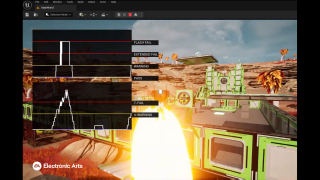EA pledges 23 more accessibility patents and open sources more tech
Six audio and sound technologies as well as photosensitivity analysis plugin to help open gaming for more players
December 5, 2024

Gaming is–and should be–for everyone.
For years now, EA has strived to make gaming as inclusive as possible and to minimize barriers between our players and our shared love for video games. And today, in this spirit and following International Day of Persons with Disabilities we have added 23 accessibility-centered patents to our industry-first accessibility patent pledge. Through this pledge, launched in 2021, we share our accessibility-related technology with the wider industry royalty-free, so that together we can work towards meeting the needs of our diverse gaming community at EA and beyond.
These newly pledged patents cover technologies to improve speech recognition, generate more personalized speech and simplify the use of speech recognition technologies in computing and gaming devices.
Among other things, these patented accessibility technologies could be used to improve the gameplay experience of players who have speech disability or who prefer or need assistance with verbally expressing themselves. They could make it possible for those players’ speech to be more effectively recognized and reflected in-game in a way that is representative of their age, emotion, language and speaking style.
To Blanca Macazaga Zuazo, Software Designer for Player & Quality Insights (PQI) Tech at EA, one of the most exciting contributions being made today is the open sourcing of a new EA-developed plugin for Unreal Engine 5 that enables in-engine use of EA’s photosensitivity analysis tech, IRIS, which was itself open-sourced as part of last year’s pledge update.
After all, Blanca is one of the key developers of IRIS and its new plugin, and has made it her mission to create, improve and evolve accessibility-based technologies to allow as many players to play and have fun as possible.
“We believe that video games should be accessible to everyone and our brilliant developers are always looking at new ways to bring that goal a step closer to reality. By making this technology available to others royalty-free, we want to encourage the industry to work together to make video games more inclusive by removing unintended barriers to access.” - Kerry Hopkins, SVP of Global Affairs at EA.

Blanca Macazaga Zuazo, Software Designer for Player & Quality Insights (PQI) Tech at EA.
Making games more accessible for everyone
Blanca is the core engineer on IRIS and has been working on it since its inception–from proof of concept up to today. The software works by analyzing captured video data, like a cutscene or spell animation, and checking to see if there are potential photosensitivity issues. If there are, they are immediately made apparent to the user so that adjustments can be made right away.
“The sooner you start testing, the sooner you find potential issues,” says Blanca. “This is where tools like IRIS come into play.”
As a user-friendly tool, IRIS has allowed developers of all levels of understanding to be able to detect potential photosensitivity issues long before they became problems. Now, with the new plugin, the same can be done directly in-engine and in real-time as developers are running their games.
And to Blanca, seeing her software open-sourced and able to be accessed by any developer and engineer around the globe has been a dream come true.
“It’s amazing to be honest,” says Blanca. “I love open source projects. We use so many of them in our day-to-day lives as software engineers that it’s great to be able to contribute our own, especially to improve accessibility. Before IRIS, there weren’t any free and easy-to-use tools for photosensitivity analysis that were available. Being able to make this contribution is incredible, because accessibility matters, and being able to try to help eliminate accessibility barriers is an incredible feeling.”
In addition to IRIS, Blanca also helped develop Fonttik, a tool open-sourced by EA in 2022 that automatically identifies text in visual content and determines whether it meets specified size and contrast ratio criteria, making it easier to check that the text can be read by players with varying vision conditions.
Before Fonttik, developers would perform these checks by counting pixel-by-pixel, a time-consuming process. This technology, Blanca highlights, is another benefit to accessibility software as it helps both the players and the developers.

IRIS working in-game development.
“That’s the main thing for wanting to develop accessibility tech–to create opportunities for people to enjoy our games in an approachable and understandable environment.”
Why accessibility matters
EA is a community driven entertainment company. And we want players and fans from all communities to be able to experience the joy of gaming and to reduce barriers so that we can all play, create, watch and connect. The accessibility patent pledge is an extension of this philosophy, as we believe that when it comes to play, a rising tide lifts all boats.
“Accessibility is becoming more important every day, which is huge news and it’s great to see the industry moving forward on this, because more people can enjoy and play these amazing games,” says Blanca. “That’s the main thing for wanting to develop accessibility tech–to create opportunities for people to enjoy our games in an approachable and understandable environment.”
EA’s accessibility patent pledge and open source projects further the company’s existing accessibility efforts, which help games and experiences reach the millions of players worldwide with disabilities. In addition to spearheading inclusive technologies like IRIS, the PQI Accessibility Team has been running accessible design workshops with select projects and expanding testing capabilities to ensure we are always designing with accessibility in mind. More to come soon!
Ready to make your play? Join EA to help us change the game.




